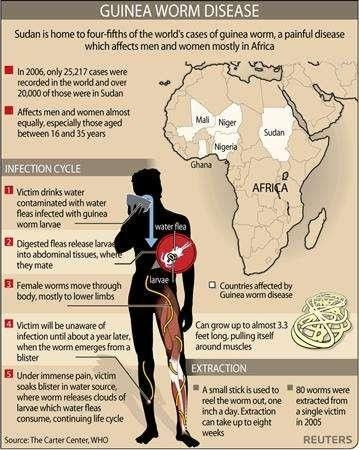Metre-Long Parasitic Worm Found Inside Man's Foot

A 38-year-old man just found out that a parasitic worm has been living inside his body for years. The Sudanese migrant, who now lives in Melbourne, visited doctors at St Vincent's Hospital in Sydney complaining of a swollen foot that has been aching for a year. Doctors took an x-ray of the foot and discovered two disintegrated sections of a meter-long Guinea worm in the lower calf and foot. Images of the worm's remains were reported on the Daily Mail.
Infectious diseases doctor Jonathan Darby explains that the person infected with Guinea worm disease (GWD) most likely drank water that contained the larvae. These worms would normally live in the host's intestines. They penetrate flesh and leave the host's body through blisters on the skin. "That whole process can take years. It can sit inside the human body alive for years or die, degenerate, and then cause problems in the area like it did for our patient," Darby said. The patient feels relieved after the parasite was removed through surgery.
The Guinea worm is the largest of the tissue parasite affecting humans, according to the World Health Organisation. Infected people usually acquire this from drinking contaminated water in ponds and wells. There is no medication to treat this disease, although the parasites are easy to eliminate. Health campaigns for more than 30 years used preventive strategies, government and international support to bring the disease close to its eradication. Finding the remaining cases of GWD is quite difficult as most cases occur in hard-to-reach remote rural areas.
From 1986 to 2012, there has been a significant decline in dracunculiasis or Guinea worm disease prevalence worldwide. Currently, it is only confined to these African countries: Chad, Ethiopia, Mali and South Sudan. The global programme on Guinea worm eradication is proving to be successful, reports the Digital Journal. In 2013, only 148 dracunculiasis cases were reported. The Carter Center initiated the global campaign against the Guinea worm disease. It will be holding a special event in January to announce important progress on the eradication efforts.




















